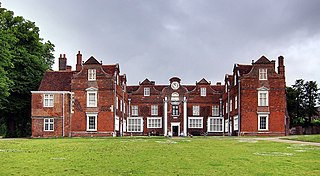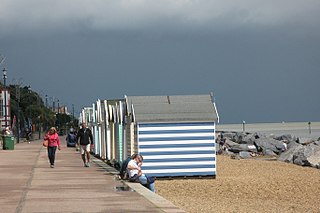
Southwold is a seaside town and civil parish on the English North Sea coast in the East Suffolk district of Suffolk. It lies at the mouth of the River Blyth within the Suffolk Coast and Heaths Area of Outstanding Natural Beauty. The town is about 11 miles (18 km) south of Lowestoft, 29 miles (47 km) north-east of Ipswich and 97 miles (156 km) north-east of London, within the parliamentary constituency of Suffolk Coastal. The "All Usual Residents" 2011 Census figure gives a total of 1,098 persons for the town. The 2012 Housing Report by the Southwold and Reydon Society concluded that 49 per cent of the dwellings are used as second homes or let to holiday-makers.

Lowestoft is a coastal town and civil parish in the East Suffolk district of Suffolk, England. As the most easterly UK settlement, it is 110 miles (177 km) north-east of London, 38 miles (61 km) north-east of Ipswich and 22 miles (35 km) south-east of Norwich, and the main town in its district. The estimated population in the built-up area exceeds 70,000. Its development grew with the fishing industry and as a seaside resort with wide sandy beaches. As fishing declined, oil and gas exploitation in the North Sea in the 1960s took over. While these too have declined, Lowestoft is becoming a regional centre of the renewable energy industry.

Ipswich is a port town and borough in Suffolk, England, of which it is the county town. The town is located in East Anglia about 16km (10mi) away from the mouth of the River Orwell and the North Sea. Ipswich is both on the Great Eastern Main Line railway and the A12 road; it is 108km (67mi) north-east of London, 72km (45mi) east-southeast of Cambridge and 64km (40mi) south of Norwich. Ipswich is surrounded by two Areas of Outstanding Natural Beauty (AONB): Suffolk Coast and Heaths and Dedham Vale.

Felixstowe is a seaside town in Suffolk, England. The estimated population in 2017 was 24,521. The Port of Felixstowe is the largest container port in the United Kingdom. Felixstowe is approximately 116km northeast of London.

The Wenlock Arms is a public house in Hoxton, in London's East End, which began trading in 1787. The pub is located halfway between Old Street and Angel, just off the City Road and the City Road Basin and Wenlock Basin on the Regent's Canal. The pub has won awards for the quality and range of its cask ales.
Tolly Cobbold is a former brewery in Suffolk, England.

The Cliff Brewery is a Grade II listed former brewery in Ipswich, England. The building dates to 1896 and was designed by William Bradford.

The Tollemache family is an English noble family, originally from Suffolk. The family's surname is pronounced TOL-mash.

John Jervis Tollemache, 1st Baron Tollemache of Helmingham Hall in Suffolk, was a British Conservative Member of Parliament and a major landowner and estate manager in Cheshire, who was raised to the peerage as Baron Tollemache "of Helmingham Hall in Suffolk".
John Cavendish Cobbold nicknamed "Johnny," was an English businessman and a grandson of Victor Cavendish, 9th Duke of Devonshire. He chaired Ipswich Town F.C. from 1957 to 1976.

Martin & Newby was the oldest shop in Ipswich, Suffolk until it closed down in June 2004. The business was established in Fore Street in 1873 and was based around 5 departments: Ironmongery, Electrical, Domestic, Gardening and Tools. The shop gave a very traditional personal service, it was reported by local press that the shop closed down because they could not compete with DIY Superstores such as B&Q and the increasing range of products offered by supermarkets.
Brent Walker was a British company involved in property, gambling, distilled beverages and pubs. It was founded by George Walker, the brother of the boxer Billy Walker.
Westbourne is a suburb of Ipswich, Suffolk on the northwestern fringe of the town. It borders the suburbs of Whitton and Castle Hill to the east and the villages of Bramford and Sproughton to the west. Whitehouse is a large estate occupying the northern part of the suburb. It is named after the West Bourne, a former stream and tributary of the River Gipping that ran east through the north of the suburb then south alongside Westbourne Road. It was diverted in the early twentieth century to supply the town with water. The former stream bed can still be seen on the eastern perimeter of the Bramford Lane Allotments and its waters can be heard flowing beneath the manhole covers on the site.
John Wilkinson Cobbold (1774–1860) was an English businessman, banker and brewer active in Ipswich.

The Margaret Catchpole is a pub in Cliff Lane, Ipswich, named after Margaret Catchpole, a servant of Elizabeth and John Cobbold of the Tolly Cobbold brewery. Built in 1936 by the local architect Harold Ridley Hooper for the Cobbold brewery, it is a Grade II* listed building. Most of its interior features have remained unaltered since the 1930s, making it one of the finest examples of this period in England. Since 2003 it has been part of the Holywells Park Conservation Area.
Thomas Cobbold was an English brewer in Harwich and Ipswich; he succeeded to the family brewing business founded by his father, also Thomas Cobbold.
The Falcon Inn is a public house located at the junction of Queen Street and Falcon Street in Ipswich Suffolk. Located at 1 Falcon street it was owned by the Falcon Brewery located next door at 5 Falcon Street.

The Steam Packet Inn was a public house located at 2/4 Duke Street, Ipswich, Suffolk, England. It closed on 18 September 1960. The building had been owned by Cobbold Brewery but after closure it was sold to Eastern Counties Farmers (ECF). The Burns family then lived there, Mr Burns being employed by ECF.
















